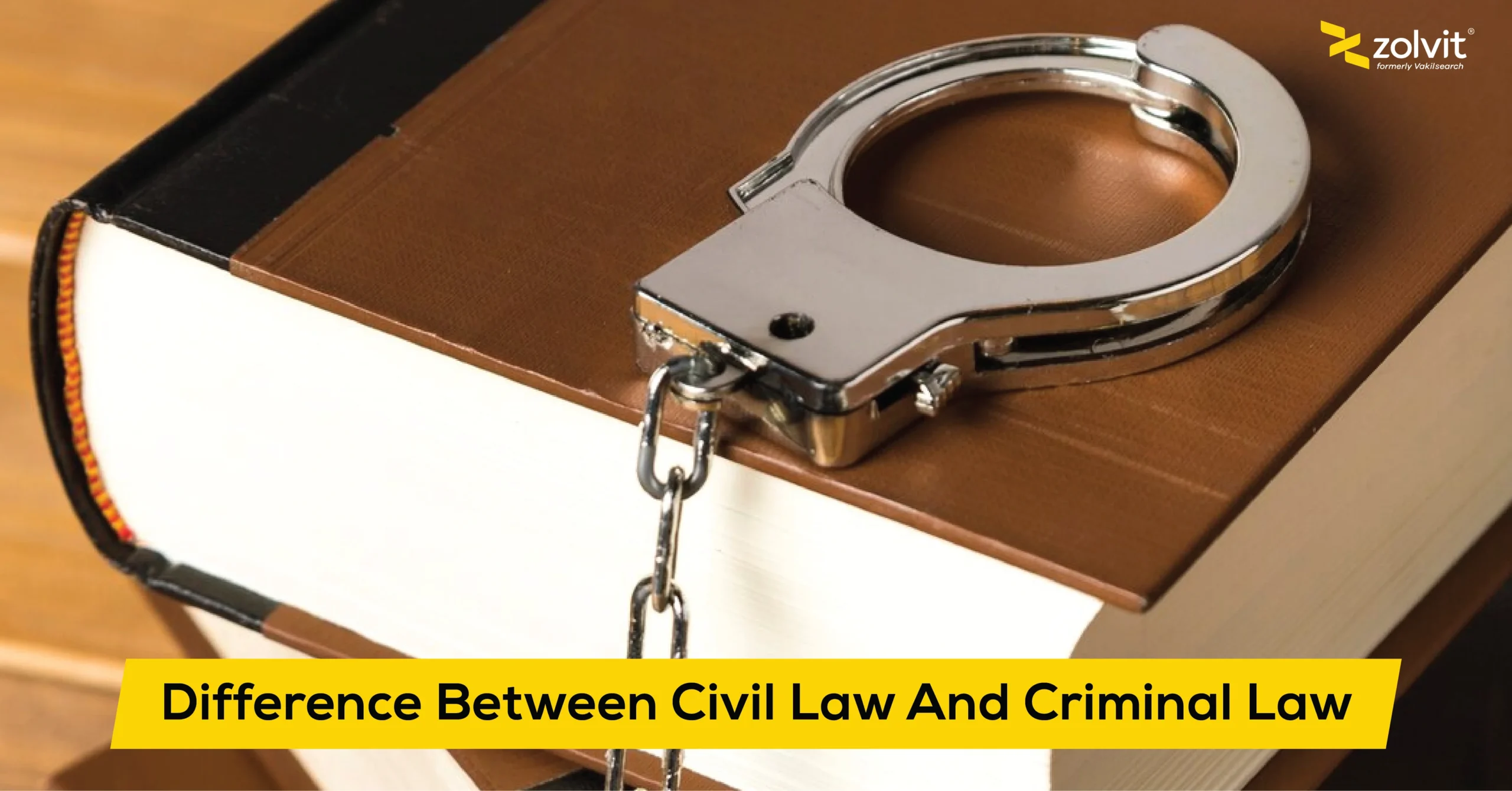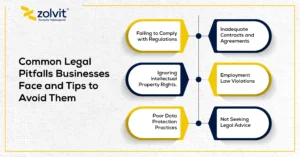Civil Law deals with Property, Money, Housing, Divorce, custody of a child in the event of divorce etc., while Criminal Law deals with offences that are committed against the society. It meets out varying degrees of punishment commensurate with the crime committed.
In this blog, we discuss the key difference between civil law and criminal law, highlighting their distinct purposes, processes, and consequences. Understanding these differences helps individuals navigate legal matters effectively and make informed decisions to protect their rights.
What is Civil Law?
Civil law addresses conflicts between private individuals or organisations, such as businesses. Often referred to as private or non-criminal law, it differs from criminal law, which deals with cases where the state is involved in prosecuting individuals.
Features in Civil Law
The key characteristics of civil law include the following: It safeguards citizens’ rights from infringement and offers a legal remedy when an individual’s rights are violated.
- Civil law encompasses rules that govern the private rights of individuals. It applies when there is a dispute between two or more parties or entities regarding the breach of terms within a legal relationship. The primary objectives of civil law include:
- Protecting individual rights
- Providing an effective remedy when a person’s rights are violated
- Most civil laws are codified, containing provisions to address various potential disputes arising from legal relationships.
- When a civil wrong occurs, the responsible party is held liable and must compensate the harmed party.
- The applicability of civil law depends on factors such as the citizens involved and the territory in question.
What is Criminal Law?
Criminal law deals with offenses and the legal consequences for those who commit them. It classifies crimes into two main categories: felonies and misdemeanors. Felonies are the most severe offenses, including crimes such as murder, robbery, and arson.
Features in Criminal Law
Key features of criminal law include:
- Binding: Criminal law applies to everyone within a specific jurisdiction.
- Punishment: Criminal law imposes penalties for crimes committed within that jurisdiction.
- No retroactive punishment: Criminal law only punishes acts that were deemed criminal at the time they occurred.
- Actus reus: A prohibited act or omission, such as homicide, rape, theft, or sedition.
- Intent or negligence: A crime must be committed with either intent (dolo) or negligence (culpa).
- Defenses: Individuals accused of crimes have the right to present defenses, such as insanity, self-defense, or mistake of law.
- Trial: A trial is the legal process where a court determines a person’s guilt or innocence.
- Criminal code: Each state has its own criminal code outlining what constitutes a crime, while the federal government has criminal law codified in Title 18 of the US Code.
- Politicality: Crimes are violations of laws established by the state.
Difference Between Civil Law and Criminal Law
Civil and criminal law serve distinct purposes, with different processes and consequences. While civil law focuses on resolving disputes and compensating victims, criminal law deals with punishing offenses against society and maintaining public order.
| Aspect | Civil Law | Criminal Law |
| Focus | Deals with disputes between individuals or entities. | Involves offenses against the state or society. |
| Examples | Contract disputes, property disputes, personal injury, and defamation. | Murder, theft, drug offenses, and other related crimes. |
| Purpose | Seeks compensation or remedy for the plaintiff’s harm or loss. | Aims to punish the offender and deter future crimes. |
| Objective | The goal of civil law is to provide legal remedies to resolve disputes and compensate the victim. | The objective is to maintain law and order by punishing wrongdoers and preventing future crimes. |
| Burden of Proof | Preponderance of evidence (more likely than not). | Beyond a reasonable doubt (higher standard). |
| Liability | It establishes liability for individuals or entities based on wrongful actions that cause personal or financial harm. | It holds individuals responsible for acts that violate public laws and threaten societal order. |
| Parties Involved | Plaintiff (person filing the case) vs. Defendant (person being sued). | Prosecution (government) vs. Defendant (accused person). |
| Legal Consequences | Results in monetary compensation or specific performance. | Results in punishment, such as imprisonment or fines. |
| Punishment | Generally involves compensatory remedies, like damages or restitution. | Involves penalties like jail time, fines, or probation. |
| Triable | Civil cases are tried in Civil Courts or tribunals where disputes between private parties are settled. | Criminal cases are heard in Sessions Courts or Criminal Courts, where the state prosecutes the accused. |
| Registration | Civil cases can be directly filed in the appropriate civil court. | Criminal cases must be registered with the police before being filed in court. |
| Filing of Cases | Filed by the individual or entity affected by the harm (plaintiff). | Filed by the state or government (prosecution). |
| Procedural Law | Focuses on resolving disputes fairly through civil procedures. | Involves criminal procedures designed to protect the rights of the accused. |
| Branches | Covers areas like Contract Law, Family Law, Property Law, Media Law, and Tort Law. | Encompasses Indian Penal Code (IPC), Bharatiya Nyaya Sanhita (BNS), Prevention of Corruption Act, and Cybercrime Laws. |
| Acts Covered | Contract Act, 1872, Hindu Marriage Act, 1955, Specific Relief Act, 1963, Consumer Protection Act, 2019, Companies Act, 2013. | Bharatiya Nyaya Sanhita (BNS), 2023 (Replaces IPC), Prevention of Money Laundering Act, 2002, Information Technology Act, 2000, Dowry Prohibition Act, 1961, Domestic Violence Act, 2005. |
Similarities Between Civil and Criminal Law
Both civil and criminal law share several important similarities, despite their distinct purposes and processes:
Reliance on Evidence
In civil cases, evidence helps prove liability or damages, while in criminal law, evidence is crucial to establish guilt or innocence.
Role of Courts
Courts play a central role in both civil law and criminal law, providing a forum for the resolution of disputes. Judges or juries evaluate the evidence, interpret the law, and make decisions based on the facts presented.
Protection of Rights
Both systems aim to protect the rights of individuals. In civil law, this could mean protecting property or contractual rights, while in criminal law, it involves safeguarding constitutional rights like due process and protection from unlawful punishment.
Why Understanding the Difference Between Civil Law and Criminal Law Matters
Understanding the difference between civil law and criminal law is protecting individual rights and avoiding legal missteps, as it enables informed decisions and enhances justice awareness.
Protecting Individual Rights
In criminal law, rights such as the presumption of innocence and the right to a fair trial ensure just treatment, while civil law allows individuals to seek compensation for wrongs done to them.
Avoiding Legal Missteps
By being legally literate, individuals can make informed decisions that prevent errors and ensure their cases are handled appropriately.
Conclusion
Understanding the difference between civil law and criminal law is crucial for effectively navigating legal issues and protecting individual rights. Civil law focuses on resolving disputes and providing remedies, while criminal law addresses offenses against society with penalties. This knowledge helps prevent legal missteps and ensures informed decision-making. For expert guidance on any legal matter, including civil and criminal cases, reach out to Zolvit for professional legal consultant.
FAQs Related To Civil And Criminal Cases
Can a case be both civil and criminal?
Yes, some cases can involve both civil and criminal elements, such as a person being sued for damages in a civil court while facing criminal charges for the same act.
What happens if you lose a civil case?
If you lose a civil case, you may be required to pay damages or comply with a court order, such as specific performance.
How do legal costs differ between civil and criminal cases?
Legal costs in criminal cases may be higher due to the complexity of defending against criminal charges, while civil cases typically involve lower costs, though they can still be significant depending on the case's complexity.
How does jurisdiction affect civil and criminal cases?
Jurisdiction determines which court has authority to hear a case, and it can differ between civil and criminal cases based on the location of the offense or the parties involved.
What protections exist for victims in civil and criminal cases?
In criminal cases, victims are protected by laws ensuring due process and fair treatment, while in civil cases, victims can seek compensation for damages or breaches of contract.
Can businesses face criminal charges?
Yes, businesses can face criminal charges if they are found guilty of committing crimes such as fraud, environmental violations, or other illegal activities.
Can someone be punished twice for the same offense?
Under the principle of double jeopardy, a person cannot be tried or punished twice for the same offense in most legal systems.
How do civil cases handle emotional distress claims?
In civil cases, emotional distress claims can be made if a party can prove that they suffered significant emotional harm due to another party's actions, often requiring medical or psychological evidence.
Related Blogs:





